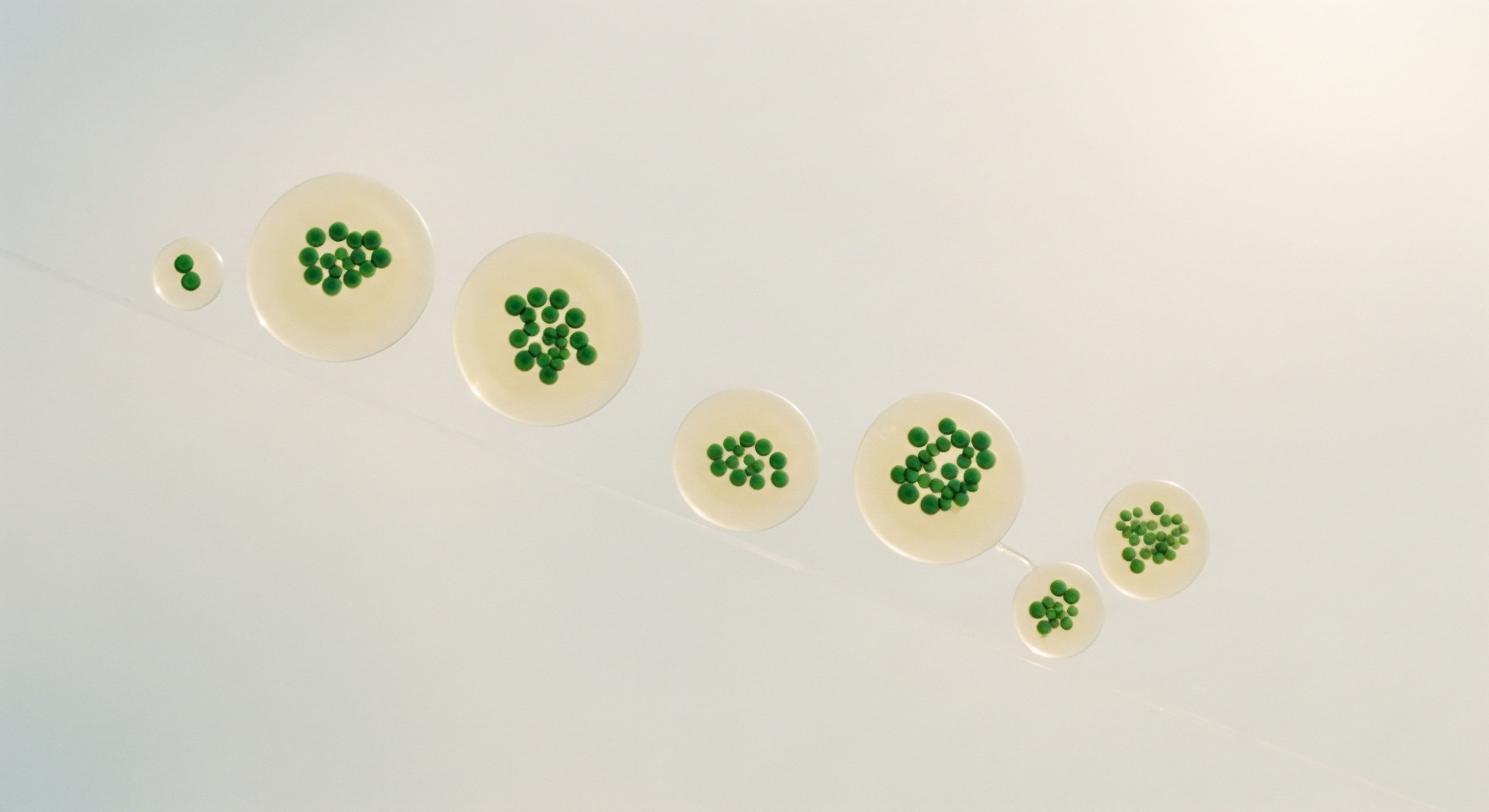

The Fading Edge of Mental Acuity
A quiet dissatisfaction often settles upon individuals when their mental sharpness begins to wane. The once-effortless sprint through complex tasks slows to a strained jog. Sustained periods of deep concentration become a challenge. This subtle impedance to cognitive flow can leave one feeling less potent, less capable of conquering daily demands with the same intensity.
Your internal operating system, despite a healthy lifestyle, might reveal slight processing lags, a diminished capacity for quick recall, or an unwelcome mental fatigue setting in sooner than desired. The drive to achieve, to perform at your peak, feels slightly out of reach.
Many high-achievers find themselves at this crossroads, recognizing a distinction between physical stamina and enduring mental horsepower. Muscles may respond to training, but the brain, that ultimate command center, seems to resist efforts at optimization. Conventional approaches often overlook the deeply systemic factors that orchestrate neural performance. A true understanding requires looking beyond surface-level symptoms, diving into the very mechanics that power every thought, every decision, every moment of sustained focus.
Consider the engine of a high-performance vehicle ∞ every component requires precision tuning and superior fuel for maximum output. The human brain operates with a similar, yet far more intricate, demand for specific internal resources. Its ability to maintain peak function across long durations depends on a consistent, high-fidelity supply line of raw biological materials. When these supplies diminish, even incrementally, the system begins to exhibit minor inefficiencies, which compound over time into noticeable dips in cognitive endurance.
Iron stands as an underestimated cornerstone of this mental architecture. Beyond its familiar role in blood oxygen transport, this metallic element participates in a complex cellular symphony. It facilitates the creation of neurotransmitters, those chemical messengers governing mood and attention. Iron also directly supports mitochondrial function, the powerhouses within every brain cell.
Diminished iron stores can thus compromise the very energy production centers that fuel sustained cognitive effort. Your ability to think clearly, to process information rapidly, to recall facts at will, relies heavily on this seemingly simple element.
Acknowledging iron’s profound influence transforms our comprehension of cognitive resilience. Instead of accepting mental fatigue as an inevitable consequence of busy schedules or advancing years, we identify a tangible, actionable leverage point. Optimizing this singular mineral provides a direct pathway to reclaiming mental vigor and extending periods of high-level intellectual output.
It offers a precise recalibration for the brain’s enduring power, granting access to deeper reserves of mental stamina. This shift in perspective moves us from passive observation to proactive mastery over our cognitive landscape.
Sustained mental performance stems from precise cellular mechanics, with optimal iron status providing a direct conduit to enhanced brain function.
The experience of vibrant cognition becomes attainable when the body’s internal machinery runs with complete efficiency. Your aspiration for unyielding focus, for mental clarity that withstands any challenge, finds its grounding in fundamental biological accuracy. Iron, therefore, operates as the definitive measure, the single most impactful variable in unlocking the brain’s capacity for unwavering performance. It offers a tangible control point for those seeking unparalleled cognitive endurance.


Calibrating Your Inner Energy Matrix
Understanding the profound impact of iron requires a look at its cellular mechanics. Iron acts as a co-factor for numerous enzymes, facilitating essential metabolic reactions within every cell, especially within the brain. Its primary function involves supporting the electron transport chain in mitochondria, the power generators of the cell.
Without sufficient iron, these energy production processes falter, leading directly to reduced cellular energy. Consider this ∞ every thought, every memory, every instance of focus requires an immense amount of localized energy. When this supply slackens, cognitive output diminishes proportionally.
Beyond energy creation, iron plays a direct part in the synthesis of neurotransmitters. Dopamine, norepinephrine, and serotonin, chemicals dictating mood, motivation, and attention, all depend on iron for their precise assembly. A scarcity of this mineral translates into less efficient neurotransmitter production, which in turn impacts your capacity for sustained drive and clear thinking. Your internal mental state, your readiness to engage with complex problems, directly mirrors the efficiency of these iron-dependent pathways.
Assessing your iron status begins with precise measurement. Standard blood panels often measure hemoglobin alone, providing only a superficial glimpse into iron stores. A comprehensive evaluation delves deeper, analyzing additional markers that reveal the true picture of iron availability and utilization.
- Ferritin ∞ This protein stores iron within the body. A low ferritin level signifies depleted iron reserves, even when hemoglobin remains within a normal range. Optimal ferritin levels generally surpass the typical laboratory “normal” threshold, often aiming for 100 ng/mL or higher for peak cognitive function.
- Transferrin Saturation (TSAT) ∞ This measurement indicates the percentage of transferrin, the iron-transporting protein, that currently carries iron. A low TSAT suggests insufficient iron movement to tissues where it is needed, including the brain.
- Total Iron Binding Capacity (TIBC) ∞ TIBC measures the blood’s capacity to bind iron. Elevated TIBC can signal low iron availability.
Achieving optimal iron status demands a multi-pronged approach, transcending simple iron supplementation. Dietary choices hold immense influence. Incorporating heme iron sources, found in red meat and certain seafood, offers superior absorption compared to non-heme iron from plant-based foods. Pairing non-heme iron sources with vitamin C enhances their absorption significantly.
Citrus fruits, bell peppers, and broccoli are excellent companions for iron-rich plant meals. Conversely, certain compounds inhibit iron uptake. Tannins in tea and coffee, phytates in legumes and grains, and excessive calcium consumption can hinder the body’s ability to absorb dietary iron. Strategic meal timing, separating iron-rich foods from these inhibitors, becomes a powerful, yet simple, optimization tactic.
For individuals with confirmed deficiencies or suboptimal levels, targeted supplementation offers a precise solution. The form of iron supplementation matters; ferrous bisglycinate often presents a gentler alternative, reducing the gastrointestinal discomfort sometimes associated with other iron salts. Dosing protocols require careful titration and ongoing monitoring, always under expert guidance.
Intravenous iron administration represents an effective route for recalibrating stores rapidly in cases of severe depletion or malabsorption. This controlled delivery ensures the mineral reaches systemic circulation with maximal efficiency, bypassing any digestive limitations.
The systemic recalibration of your iron matrix represents a direct investment in sustaining higher levels of cognitive performance. It shifts the internal environment, providing the cellular machinery with the foundational resources needed for sustained mental output. This deliberate, evidence-backed approach allows for a conscious shaping of your brain’s capacity for enduring sharpness.


Strategic Activation for Sustained Brilliance
The decision to pursue iron optimization aligns with a broader commitment to peak personal performance. It applies to individuals experiencing subtle declines in focus or mental energy, those seeking a competitive edge in demanding intellectual environments, and anyone desiring sustained cognitive endurance across their lifespan.
Consider this path when you encounter persistent mental fatigue, even after sufficient rest. Identify opportunities for intervention when your ability to maintain concentration during prolonged tasks diminishes. Recognize the moment to act when your mental clarity appears compromised or when your cognitive recovery after intense mental exertion slows.
Initiating an iron optimization protocol follows a precise sequence. The initial step always involves a comprehensive diagnostic panel, moving beyond basic blood counts to include ferritin, TSAT, and TIBC. This provides the granular data necessary for a personalized plan.
Following diagnosis, a skilled practitioner will guide you through a tailored intervention, which could encompass dietary adjustments, strategic oral supplementation, or, in specific cases, intravenous iron administration. The selection of the intervention route depends entirely on the degree of iron depletion and individual physiological responses.
You will begin to perceive shifts within weeks of consistent adherence to a personalized iron protocol. Early indicators include a perceptible increase in baseline energy levels. The mental fog that once obscured sharp thinking starts to lift, revealing enhanced clarity. Within the first two to three months, sustained cognitive benefits become more pronounced.
Periods of concentration extend naturally, without the previous effort or fatigue. Recall speed accelerates, and mental processing feels smoother, more fluid. Individuals often report a renewed sense of mental stamina, enabling them to tackle demanding projects with vigor for longer durations.
This journey toward optimal iron status represents a proactive measure against cognitive deceleration. It moves beyond merely treating a deficiency; it seeks to position your brain’s internal chemistry for maximal output. The payoff extends beyond simple symptom remission, reaching into realms of enhanced productivity, heightened mental resilience, and a profound sense of cognitive mastery.
Imagine navigating complex challenges with an unyielding mental drive, your focus remaining unwavering through extended work sessions or demanding creative endeavors. This level of sustained cognitive brilliance becomes an attainable reality.
The true value of this proactive approach lies in its long-term dividends. Maintaining optimal iron levels supports overall cellular health, contributing to systemic vitality. This foundational biological recalibration helps guard against future cognitive decline, preserving your mental edge for years to come. It represents a continuous investment in your intellectual capital, ensuring your brain remains a high-performing asset throughout every stage of life. This path offers a tangible strategy for sculpting a future defined by enduring mental power.

Shaping Your Cognitive Legacy
The understanding of iron’s central role transforms the passive acceptance of mental ebb into an active pursuit of cognitive dominance. We transcend the conventional view, recognizing that the brain’s enduring performance hinges on fundamental biological precision. This commitment to internal mastery reshapes your capacity for output, allowing for an unwavering mental presence. You become the conscious architect of your own cognitive trajectory, dicturing a future of relentless mental strength.
Consider the words of Viktor Frankl, who spoke of meaning and purpose in the face of adversity. Applying this wisdom to our biology, we find that sustained cognitive endurance becomes a vehicle for deeper engagement with the world. It provides the unwavering mental capital to pursue endeavors of significant personal meaning, transforming aspiration into tangible achievement. This precise calibration of your inner chemistry enables a life lived with uncompromised mental acuity, a testament to intelligent self-governance.



